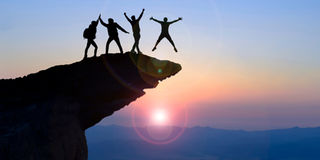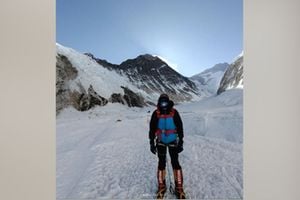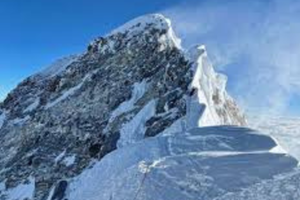
Mountaineering is about embracing the journey, immersing oneself in nature's grandeur, and conquering the challenges.
For many mountain climbers, Mt. Everest remains a dream and when they either summit or attempt it in part, they write history. It could be personal or otherwise but history is written in their favour.
The death of Cheruiyot Kirui on Thursday as he attempted to peak Mt Everest, the highest point on Earth, may have dampened the hopes of some hikers who had plans of summiting, but not for adrenaline junkies.
Even though it is a known danger, at a staggering 29,029 feet above sea level, that is about 8,848 metres, some mountaineers are still planning to throw their hats in the ring for this challenging duel year after year, well aware of the many bodies buried under avalanche snow or lying catchment basin slopes.
Lifestyle spoke to different hikers to get their perspective.
Robert Kamaru, hiker and founder of Outdoorer
“I intend to climb Mt. Everest. The motivation remains alive despite the dangers associated with it. To hikers, Mt Everest is like winning a gold medal in the Olympics. I have already climbed Mt. Kenya and Mt Kilimanjaro, so what next?

Robert Kamaru, hiker and founder of Outdoorer
For hikers, once you start mountain climbing, it is like a drug; you want more of it, and the next challenge soon becomes your previous challenge. There is always a higher peak you want to reach.
However, any mountaineer needs to seek comfort in the fact that the mountain has been there for donkey years. Know your limits and respect them. There is no shame in going back down if going up proves difficult.
The top risks are altitude sicknesses like high-altitude pulmonary and cerebral oedema, severe weather, and a short supply of oxygen, among others.
There are also places on the mountain that are dangerous, such as the death zone of Mt. Everest. In this place, oxygen is limited and therefore very dangerous.
Additionally, one needs body mastery for the journey; this is awareness of what your body can and cannot do.
Micheal Mwaniki, 28, hiker and MD of Adventure-go-hiking
I would go to Mt Everest and still encourage everyone with a similar dream to hike to the highest point. It's part of the adventure; such accidents happen, and unfortunately, it's something we love doing. Every dream comes with challenges. If reaching Mt Everest is my dream, I would pursue it despite the risks. However, I have many destinations in Africa to explore before considering Mt Everest as my ultimate goal.

Micheal Mwaniki, 28, the managing director, adventure go hiking
I knew Cheruiyuot; we hiked together once. It takes immense courage to climb, and the fact that he did it without oxygen is truly inspiring.
Non-hikers would wonder why we keep doing it. Mountaineering isn't just about reaching the summit; it's about embracing the journey, immersing oneself in nature's grandeur, and conquering the challenges that shape us. I have done over 400 hikes and counting.
For me, hiking is where passion meets perseverance, and every step forward fuels the soul with a sense of accomplishment.
To die doing something you love is, in my view, more meaningful than facing an accidental fate.
Cyrus Ogaru, 34, founder of Hikers Afrique
I've hiked all the major peaks, including Mt Kenya and Mt Kilimanjaro. I've discovered and facilitated hikes on almost 100 trails around Nairobi and other areas, totalling about 200 hikes and trails in Kenya and Tanzania.
Despite the risks involved, hiking remains a passion for me, and I aspire to hike Mt Everest. Hiking is therapy.
I did not stop when I did my most challenging hike which was Kijabe Hills, when I wasn't in good shape, so why stop now?
Denis Mureithi, 28, avid hiker and gym instructor
Even extreme adventurers have their limits. With a 70 percent chance of never returning from Mt Everest and only a 30 percent chance of returning, it's not something I'm willing to risk.
Reaching Mt Everest was once my ultimate goal, but the stories of people dying there made me shelve my dream. I want to explore and experience as much as possible in many places, but not at such a high risk.
The people who go to Mt Everest are professionals with far more experience than I have. I cannot dare take such a risk unless my circumstances change significantly in the future. Maybe then, I might consider it.
I climbed Mt Kenya and it was challenging because of the altitude change at every level. The more you continue the more the temperature changes, if you have not done the pre-hike before, it will be a tough one to the summit.
However, it doesn't mean I will stop hiking any time soon; mountains are my sanctuary, my playground of possibilities, where I find solace, strength, and an unyielding connection to the world around me.
Alex Kamau, 31, an avid hiker and founder of Let’s Drift
I recently had my first experience when I attempted to climb Mount Everest, but I only made it to the Base Camp, which is not extremely high—just about 500 meters higher than Mt Kenya.
When I sought advice from my guide about climbing Mt Everest, I made sure to share my previous experiences. The hike was too tough, it was beyond what I felt capable of.

Alex Kamau, 31, an avid hiker and founder at Let’s drift.
Knowing what I know now, I wouldn't attempt again. I love adventure and risk, but I have a threshold. My goal is to explore and experience new places rather than break records or gain recognition.
Although I have hiked 10 hills and three mountains, Mt Everest poses too much risk for me due to my limited experience with high altitude, which requires significant training for altitudes of 6000-7000 metres. I'm unsure if I can commit to that level of preparation.
I started hiking as a quarter-life crisis; I wanted to find myself which I found very therapeutic. I became hooked on looking for the next adventure.
So, what does it take to summit Mt. Everest? Time.
Once you arrive at the base camp, several activities are prepared for climbers to acclimatise to the terrain, the climate and equipped with skills necessary for the journey up the mountain.
It also takes huge preparation. Before you attempt the tallest mountain on the Planet, it is crucial to have tried other easier ones. Mt Everest is way above 8,000 meters above sea level. So here, we are talking about attempting to climb 6,000- to 7,000-meter-high mountains before you attempt Mt Everest.
The body, being the main carrier of the activity needs to be in line with your ambition.
Physical fitness is non-negotiable. You want to go up there while you are fit to increase your chances of survival. Additionally, the gods must be on your side.
There are three outcomes when you make such a commitment; You can come back whole, you can lose a part of your body or its functionality or you could fail to return at all. The mountains are known to swallow people.
Once you have decided to do the hike, you have to make peace with the fact that you could go up and not come back. So, you prepare your loved ones for any happenstances. Further, you need to either have enough money or have sponsors.
Enough here is in the region of Sh8 million to Sh10 million and that’s on a modest scale. It could cost as much as Sh30 million.
Then, do your homework well. Get to understand the prevailing weather. Some seasons are good; others aren’t as friendly. It is prudent to have enough knowledge about the conditions to avoid setting yourself up."








